
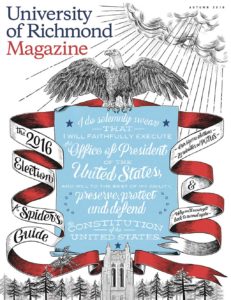
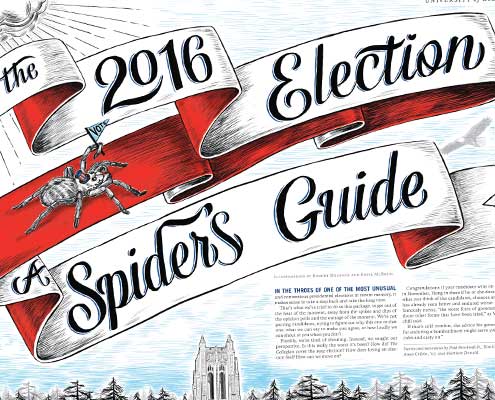
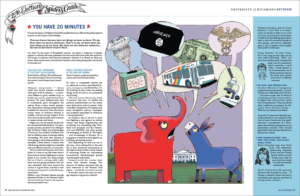
Most issues have economic, sociological, technical, and personal angles, in addition to political implications and historical contexts. The question of what’s really at stake or why something matters always lurks in the background.
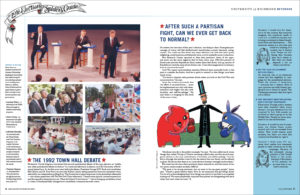
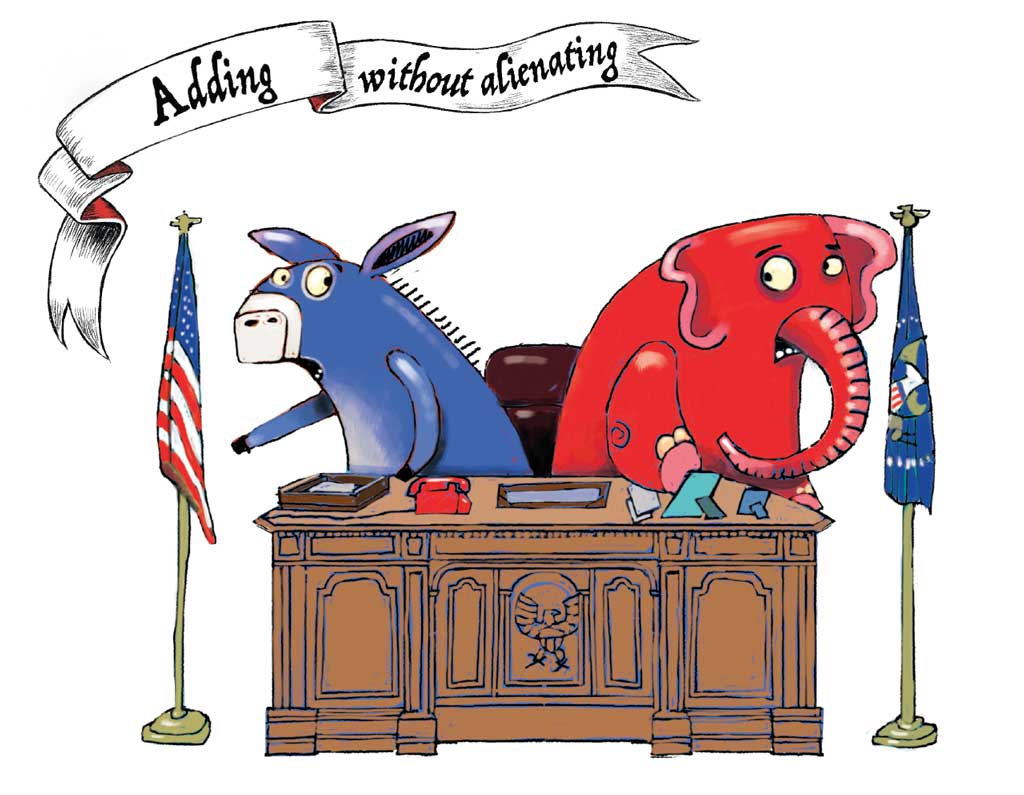
Surfing the Current
How do you speak to events weeks after the headlines break?
By Matthew Dewald
Let’s face it. There’s a problem with this article. I’m composing these words in the middle of February. President Trump’s administration is three weeks old, public protests are happening all over the place, and Beyoncé just announced she’s having twins — twins!
Remember all of that? That’s my world today, but it’s not yours anymore. You’ve moved on.
That’s where the problem comes in. Between my writing and your reading falls a chasm. This magazine, like the alumni magazine I edit, has production timelines measured in months. You’re reading this in midspring, maybe later. Perhaps our politics have become less volatile in the months that have passed. Perhaps you’re looking back on my now as the good ol’ days. I have no clue.
This gap in time makes it difficult for me to write an article for you about current issues.
Another disadvantage I have, particularly as an alumni magazine editor, is a well-grounded self-interest in timidity. I often describe our audience like Walt Whitman described himself: “I am large, I contain multitudes.” Our readers range in age from 22 to 102, studied everything from business to poetry to biochem, and have almost every mainstream and fringe political view you can imagine. My magazine’s mission is to encourage every one of them to love and support the university I call home. Even appearing to be partisan — by commission or omission — hurts that goal.
I face some other challenges as well. The major news outlets have the world’s most recognized experts at their fingertips, ready to be tapped for analysis and perspective. My Rolodex is different. And there’s the saturation question. With everyone talking about the top issues day and night, what can we possibly add to the conversation?
For an alumni magazine editor like me, there’s an alluring temptation — just avoid current events. Plod safer ground. However, this path has a downside: It risks making us less relevant to our readers. As I write, I don’t know what’s happening in the news as you read, but I bet it’s on your mind.
Despite these obstacles, there are ways for publications with timelines like ours to be part of conversations about current events. The really good news for alumni publications, in particular, is that the strategies we can use to join these conversations are ones that will typically advance the institutional brands we’re building.
At the University of Richmond, we had recent experience with this when we decided to preview the November presidential election in our Autumn 2016 issue. We made this decision in May 2016, and it’s important to remind you of the political landscape then. The parties’ conventions wouldn’t happen until late July, and both of their eventual nominees were inspiring significant intraparty discontent. There was even talk of a third-party run by Michael Bloomberg or someone else.
To meet our production schedule, we’d need to complete the planning in May and June, the reporting and writing in June and July, and the design in July and August so we could hit our file-to-printer date in late August. In other words, we’d have to develop the guide before we knew with absolute certainty who the major-party candidates were, let alone what issues would erupt once they turned their sights squarely on one another. Furthermore, the issue would begin hitting mailboxes just as the presidential debates were getting underway.
The only thing clear to us as we started to plan was that the election would be the most contentious in recent memory, and we had no interest in making anyone angry with the institution because of the magazine.
Ultimately, we produced a 10-page cover package with 11 distinct editorial pieces, plus 13 original illustrations and a handful of archival photographs. To arrive at the final package, we brainstormed and discarded dozens of ideas and, along the way, gave careful thought to what might have staying power no matter where our political discourse led. Our deliberations often came back to a question I asked several paragraphs ago: What can we possibly add to the conversation? For us, that question was not an end point. It was where we started.
Our magazine is published by a university. We develop critical thinkers who can place information in context, see broad patterns and root causes, and understand multiple points of view. If the magazine can do the same, we exemplify our institution’s mission and bring distinctly Richmond voices to our Richmond readers. That’s a part of the national conversation we can offer them that no one else will. In this case, rather than examine the throes of this election and events we couldn’t anticipate, we focused on a close look at the nature of the presidency and elections themselves. This approach gave us wide range in which to roam and, we hoped, would offer context for whatever day-to-day news would come.
Here are three specific strategies we used to develop our story budget in a way that was independent of future events but likely to deepen readers’ thinking about them, and that also helped advance our institutional communication goals.
1. Think creatively about who your experts are.
As you would imagine, our story package offered a healthy dose of faculty expertise, but one of our longest sections relied on some less obvious experts: international students.
A writer on staff interviewed eight students from different parts of the world about watching an American election up close for the first time and then wrote up the common themes that emerged. We called the piece “Broad stripes, bright stars, bizarre elections: Six takeaways from talking to international students about American elections.” We followed each takeaway — e.g., “We share some common fears” — with relevant quotes from two or three individuals.
This satisfied several goals. We offered an angle on the election I still haven’t seen anyone else do — another answer to the “What can we add?” question. We also accomplished an institutional goal of highlighting our international programs and offered an example of how recruiting students from diverse backgrounds strengthens learning for all students.
A related, online-only story added another variation on the expert: the novice with access. We learned in early August that one of our students had been an alternate delegate at the Republican National Convention. “I’m the future of the party,” he told us. With this piece, we offered a look at the convention and the issues animating his party through his eyes.
At universities, it’s easy to fall back on thinking that experts are the people whose names are followed by “Ph.D.” They certainly offer important kinds of expertise, but perspective, experience, and access create other kinds of experts who should also be on an editor’s radar.
2. Go there: Get local, historical, and personal. We did all three.
Finding the local angle is a staple of your town’s newspaper and television stations, and it can work well for a university magazine, too. We lucked into a great local angle for us when Hillary Clinton tapped Sen. Tim Kaine, a former Richmond city mayor, as her running mate. He began teaching at Richmond’s law school as an adjunct in 1987 and continued teaching and speaking here during his rise through city and then state politics. When he was tapped for the VP spot, he still held a visiting faculty appointment.
While it wasn’t appropriate for us to advocate or oppose his candidacy, it was appropriate for us to highlight the connection. A story in the magazine’s News section recapped national media interviews with our faculty that included their comments about Kaine as both a candidate and colleague. We also ran a funny-in-retrospect quote from a commencement speech Kaine gave during his last year as Virginia’s governor, in which he said he didn’t expect to see his name on a bumper sticker ever again.
Getting local also meant getting historical as we took advantage of an opportunity to show off the university’s past brushes with presidents. We ran a 70-year-old quote spoken by Dwight Eisenhower in the university’s chapel and recounted the historical significance of the groundbreaking Bush-Clinton-Perot town hall-style debate in 1992, which happened in our basketball arena. We listed other times presidents had been on campus, all with the unstated but clear message that Richmond is the kind of place to which presidents come. Finally, we reflected on student engagement with politics in a look back at the student newspaper’s coverage of presidential politics over the last century.
We got personal in the editor’s note and the president’s column. In my editor’s note, I told the story of walking to the polls alongside my father the first time I voted; we joked the whole way about canceling out each other’s vote. The president’s column offered a similar theme in more high-minded language, with an anecdote about the importance of listening across differences. Both emphasized civility, something we were hopeful the entire issue would reinforce.
3. Ask questions that are contrarian, counterintuitive, and fundamental.
These questions yielded some of the most amusing and, I hope, enlightening passages in the election package. We set up one of our contrarian questions by pointing out how long the campaign had already been going on and how expensive it would be, all to elect someone to an office that pays less than the minimum for an NFL rookie. “Is who gets elected really this important?” we asked. That question became the springboard for showcasing faculty expertise in a piece on the nature of the modern presidency and the expansion of the federal government during the 20th century. It also helped us hone in on the stakes of the presidential election without commenting on the merits of particular candidates.
We observed that the overwhelming focus of the media coverage was on winning: winning a primary, a nomination, a debate, and, eventually, an election. Counterintuitive thinking led us to a different question: What is it like to lose? In a snippet called “The lonesome loser,” we talked with an alumnus who’d worked in Marco Rubio’s campaign about how it feels to lose on election night. “All you can do,” he said, “is hope that you’re just as passionate about the next fight as you were about this one.”
We also asked a fundamental question that looked forward with hope: Amid such partisan rancor, how do we reconcile with one another? We turned to a Civil War expert on our faculty for the long view. “I’m hard to impress with partisan divide when you look at the Civil War and reconstruction,” he assured us.
Recurring events — like elections, Olympics, and such — make it easy to reach back as a way of looking forward, but spontaneous events that percolate in the news can yield great alumni magazine articles, too. Demonstrations that erupt suddenly always address issues with deep roots. Dramatic changes in policy direction and the waxing and waning of diplomatic relations have antecedents. Most issues have economic, sociological, technical, and personal angles, in addition to political implications and historical contexts. The question of what’s really at stake or why something matters always lurks in the background. These are the kinds of deeper questions we ask our university students to consider in class every day. We can raise them in the magazine’s pages for alumni, too.
Before we went to press with the election issue, I confess that I proofread with the expectation that Hillary Clinton would win the election. That’s what every poll was saying. I read each sentence with that outcome in mind, asking myself how anything might be interpreted to our detriment after the election. The “lonesome loser” piece is a good example. Our alumnus source was a Republican, and the polls pointed to a Republican loss. Were we writing about losing any election or about Trump losing this one? I wanted to be able to look back at the package and have a sense that it held up no matter how the election turned out.
Clinton’s loss was a good litmus test of whether my incorrect expectations colored our package, and I think we did all right. I’m already looking ahead to a possible feature on an alumnus who was just elected to the House of Representatives. I’ll report and write it months before anyone reads it. My goal is that it will illuminate one alum’s experience of being a public servant at the dawn of the Trump administration and that it will increase every reader’s connection to the university. Wish me well.
Matthew Dewald is editor of University of Richmond Magazine in Virginia. He reads a lot of news but does his best not to make it. Before, he read a lot of Irish novels and modern poetry as a graduate student in literature at the University of Cincinnati. Connect at tinyurl.com/linkedin-dewald.

